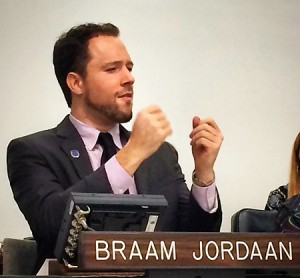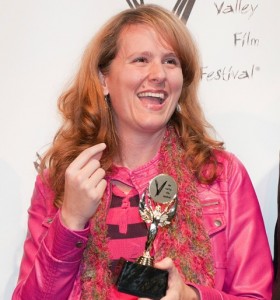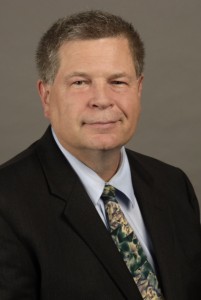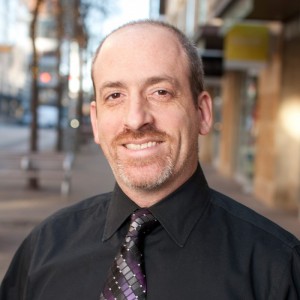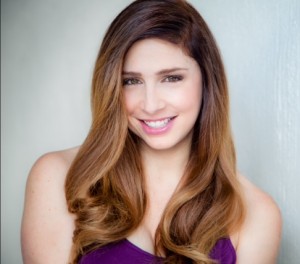Too often, young people who are deaf are discouraged from following their dreams. They are told “you can’t…” or “you won’t be able to…” and they are pushed to into careers that they are not passionate about. In reality, however, there are very few jobs Deaf people “can’t” do, especially once small adjustments are made to accommodate their specific skills and abilities. At the end of the day, our society limits people more than the actual experience of deafness ever could.
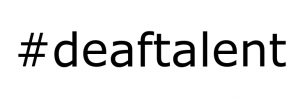 #DeafTalent is a cultural movement that is gaining traction in all areas of life. Talented Deaf individuals in fields across the board are working to defy social expectations, remove barriers, and prove that there are NO limits to what people who are deaf can do. My Deaf siblings and young nieces deserve every opportunity to manifest their own destiny and accomplish their own goals without suffering the prejudice of previous generations. It’s time for people to open their minds to the endless potential of our diverse population.
#DeafTalent is a cultural movement that is gaining traction in all areas of life. Talented Deaf individuals in fields across the board are working to defy social expectations, remove barriers, and prove that there are NO limits to what people who are deaf can do. My Deaf siblings and young nieces deserve every opportunity to manifest their own destiny and accomplish their own goals without suffering the prejudice of previous generations. It’s time for people to open their minds to the endless potential of our diverse population.
To explore the many facets of DeafTalent, I went right to the source: the Deaf community. Individuals working in a number of different fields were eager to communicate a message of Deaf empowerment. We are back at it with part V in an ongoing series about Deaf Talent in America! Be sure to check out Part I, Part II, Part III, and Part IV, and follow along for future installments!
Charmaine Hlibok
Director of Fundraising at Mark Seven Deaf Foundation
http://www.campmark7.org/
Inspirations:
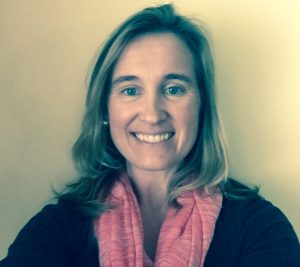 When I joined the board in 2006 for CampMark7, I was a stay at home mom with 4 children and my 4th was just born. Gerry Buckley had asked me when I was very pregnant to consider serving on the board because of my involvement with the CODA community here in Maryland. I hosted their Winter Holiday party and was very involved with their year-round activities to make sure that my CODA kids had strong identity with other members the Deaf community, which is very important to me. Seeing that had a huge impact on my children’s attitude about having deaf parents because they would have other CODAs to look up to. They could feel proud and become very involved. Really it made a difference in how they were able to identify their own self esteem, perform better in school, understand their own abilities. It helped on all levels.
When I joined the board in 2006 for CampMark7, I was a stay at home mom with 4 children and my 4th was just born. Gerry Buckley had asked me when I was very pregnant to consider serving on the board because of my involvement with the CODA community here in Maryland. I hosted their Winter Holiday party and was very involved with their year-round activities to make sure that my CODA kids had strong identity with other members the Deaf community, which is very important to me. Seeing that had a huge impact on my children’s attitude about having deaf parents because they would have other CODAs to look up to. They could feel proud and become very involved. Really it made a difference in how they were able to identify their own self esteem, perform better in school, understand their own abilities. It helped on all levels.
I was a camper in 1988. I joined CM7 for the first time when I left Chicago to go to camp for 3 weeks overnight. The camp itself pretty much changed me as a person, it’s where i found my identity as a deaf person and i knew where I stood in the deaf community because I grew up in a mainstream society in the Chicago area.
When I was offered the opportunity to serve on the board, immediately there there was no question I was going to join. I hit the ground running then. I decided to first become the secretary, then when the chair person decided to step down to pursue their PhD, she had asked me “would you be interested in taking this role?” My daughter was only 1 then, but something inside told me to just go for it. Why not? So i did, I took the plunge.
Before I knew it, I started to host more fundraisers and I noted that that brought people together. It wasn’t only about raising money for the camp, we also bonded as a community and the reason why is that there were a lot of volunteers who became involved in supporting the camp. CODAs, deaf people, all sorts of different people from a variety of programs and that was inspiring for me to see how many people were willing to volunteer and had the energy to support this. That really struck me as the importance of continuing this type of organization and involvement.
Barriers:
I’m not sure if this was a barrier or not, but the only barrier I had to overcome with this process was that there are some people who are afraid to make changes. They are so accustomed to the status quo and when people approach them with a new idea, they are like “wait no no hold on, I need to do my research, we need to check that we are following this or that rule.” But by the time that we figure it out, it’s too late! So it’s important for us to maintain the excitement of change and new ideas and really capitalize on the timing and the support from the people who are motivated to be involved. That is all about inspiring people and really wanting to keep the flame going. So thats basically an aspect of volunteerism— to inspire people to want to volunteer.
Deaf Advantages:
The feeling of unity and common interest and goals and support and language, THAT foundation is the feeling of CM7. When you go there, its different than other place because you feel you own the camp because you’re part of it. You’re part of this community. Anyone who goes and volunteers, they contribute to this growth and development and I feel that that’s their reward. And that’s what I see, the unity of the community, feeling a sense of pride. That’s a really big part of it.
I think that now CampMark7 gets so much attention because we are unique. Not because we have a disability but because we have a deaf ability. And that is what fascinates people, it’s our niche, if you will, and that’s the key. To have a cause that people are fascinated with, for example ASL is becoming a hot topic so people are becoming fascinated by the culture and the language and the community and the unity. That’s a huge advantage for the deaf in the nonprofit world.
Advice:
I believe strongly that it is about your vision. You must have a unique purpose, something that sets you apart from other organizations. To be very creative and network, that is key. It really is. TO be able to network and network outside of your comfort zone. To latch on to other networks because you’d be amazed at what people can bring to your organization and how they can really support you and your mission. It’s a you scratch my back, I’ll scratch your back situation— you support me and I’ll support you. And you have to be able to also inspire the people that you work with, as well. Make them feel good about the work they are doing and you can see results from that as well. Give credit where credit is due, that is key. Make people feel valued and appreciated because they are volunteering their time. In nonprofit, you know, you don’t make a lot of money so you really rely on volunteering to accomplish things.
David Kurs
Artistic Director Deaf West
Inspirations:
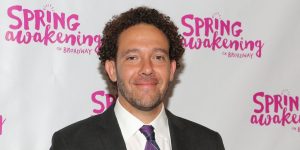 I am very passionate about the power of art to educate, inspire, and to spark curiosity. I feel that it is the best way to explain our language and culture to the world.
I am very passionate about the power of art to educate, inspire, and to spark curiosity. I feel that it is the best way to explain our language and culture to the world.
Barriers:
From the vantage point of my position as Artistic Director, it is the lack of funding for artistic opportunities for deaf individuals.
Deaf Advantage:
Deaf people are natural communicators. They have taught themselves how to communicate with the world around them since birth. Because of this, they are excellent actors. Sign language also compels the speaker to be honest, and I feel that signers are attuned to their consciousness.
Advice:
Instead of working within a system that does not understand you (or patronizes you), create your own opportunities by staging your own shows, writing your own material, and developing your talents.
Ashley Letourneau
Owner Signs of Life, LLC
http://www.signsoflife.expert/
Inspirations:
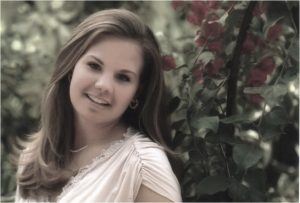 In second grade, I wanted to be a writer. This was mostly because my family and the school system was pressured to raise me orally, with hearing aids and other devices. I was socially awkward and the best way I could communicate was on paper. I liked creating stories and novels I could escape into and avoid dealing with bullies and the feelings of loneliness that clung to me wherever I went.
In second grade, I wanted to be a writer. This was mostly because my family and the school system was pressured to raise me orally, with hearing aids and other devices. I was socially awkward and the best way I could communicate was on paper. I liked creating stories and novels I could escape into and avoid dealing with bullies and the feelings of loneliness that clung to me wherever I went.
In Spring 2014, I graduated with a Bachelor’s degree in Communication with a triple emphasis in Public Relations, Organizational Communication, and Conflict management and Mediation. I also received three minors in the areas of Psychology, Sociology, and Human Development. In Fall of 2014, I dove right back in and began my second Bachelor’s degree for Social Work, ultimately planning to get my Master’s degree with emphases in Advocacy and Law.
I realized that people were asking for my services and support. I was already legally defending deaf individuals in informal situations. Everything I wanted my business to be was already sort of happening, just in a very scattered way. So I decided that I am going to prove to myself and this world that I can make a difference. As soon as I got the ball rolling, I felt unstoppable and I know that is where I am meant to be.
Barriers:
In my communication class at my college, we had groups of 7 people randomly assigned to do a semester-long project together… I kindly explained that an interpreter request to disability services office usually requires at least 48-72 hours in advance notice, not including weekend. The rest of my group scheduled meetings anyway. I had no clue what was going on. Later that week, I am informed that the group kicked me out. They went to the professor and said that they felt that I needed to be kicked out due to learning and communication style differences and because having an interpreter at all meetings is just too uncomfortable for them. The professor said that if it was majority vote, and I was out, then that is fair. I fought this and said it was discrimination.
The Chair of the Communication department told me, “Ashley, you need to accept now that you are a detriment to groups and the overall group processes. The sooner you realize this, the sooner you can adapt to the expectations. I worry about you and I don’t see how a deaf person can realistically succeed in a Communication field. Just don’t get your hopes up.” I walked out of the room completely shocked and I didn’t know what to do.
[Another] hurdle came from my recent involvement with the Social Work program. Like Communication students, Social work students don’t think I should always have an interpreter. They think I should voice for myself. We had to pick partners or groups to present a topic in front of class at the end of the semester…. The thing is, no one wanted me in their group. Made excuses. The professor was on my side but he didn’t think forcing me into a group would be helpful. And he said I might just have to do the project all by myself. I began being sidelined, purposely not included or informed of informal get-togethers over the weekend with Social Work members. I was out of the loop. I was told that not speaking and only signing is a poor way to go… Therefore, I withdrew from the semester.
I needed to do the best for me and I needed to get my act together. At this time, my business dream and vision just took off like a skyrocket! I decided that I would turn this anxiety, hurt, and depression, into something positive. Help other people. Change the world.
Deaf Advantage:
After my [first] diagnosis [at 3 years old] I was fitted for hearing aids and raised orally, without American Sign Language. Myself, and many others who are born with this rare type of hearing loss, sometimes called reverse-slope, develop normal speech and language skills with proper accommodations in certain situations. However, I was still a social outsider. Lonely. No friends.
In the beginning of my teen years, my hearing loss changed drastically, causes unknown. I was diagnosed with a bilateral moderate-severe high-frequency hearing loss. No longer was I mildly hard of hearing; I was considered legally deaf. Though I still utilized hearing aids and my speech was flawless, I truly was—am, deaf.
With that being said, I am Deaf. ASL is my language. However, I am in a unique situation, to say the least. I can serve Deaf, hard of hearing, and hearing people. I help with services, help answer questions, do community outreach, teach ASL lessons, etc. Because I have flawless speech, most people don’t think I am deaf. Even when they accept the fact, they still seem to not quite understand. It’s my job to explain.
So in my line of work, I can connect with all different people. I can use multiple modes of communication. I will say, though, it is sad when I help someone get the services they need and the person who previously stood in their way has no problem working with me: working under the assumption that I am hearing. As if that would give me more credibility. Sometimes, knowing my deafness, people can be put off by it and it’s harder to gain services for my clients. I am only able to do so and make them take me seriously because I know the law like the back of my hand. I am eloquent with words, for the most part, and I am eloquent with sign. I make what needs to happen, happen. Regardless of my deafness. However, I think my deafness also benefits me because I have a wider business network. And I have resources I need to run my business. And I can teach lessons because I am perceptive. Overall, my deafness has been nothing but a blessing
Advice:
Well, the thing is, anyone can start a business. It’s not that hard. The hard part is analyzing your target market, looking at your demographics, and figuring out what they need. You could have the coolest business in the world but if it’s not something that makes a difference for people, you will not succeed.
My suggestion is to come up with an idea and run it by a business professional. Many states have local agencies that work with small businesses for free. They offer counseling about financial revenue budgeting, help you make a solid business plan, help you figure out where you might be able to qualify for grants or seed money, etc. Being your own boss is the best feeling in the world, but it is important that you have a solid foundation to start on.
I am entertaining the idea of started a group for Deaf people who are entrepreneurs or small business owners or whatever to get together online or something share tips for successful businesses and a place we can write positive and supportive comments to one another. Maybe that is a project I will start later down the road.
Peter Rozynski
Softball / Baseball Umpire
Inspirations:
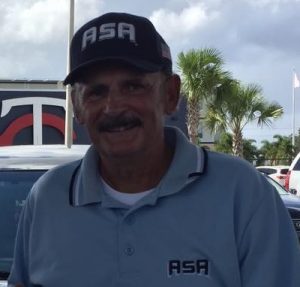 “Do not hide your enthusiasm. Do not hide your talents. Use it and show it to others.” This quote has definitely influenced me to become inspired into a softball umpiring career for one simple reason. Willing to take risks and accepting challenges are essentially significant to show the umpiring community that I have my abilities. I find it a once in a lifetime opportunity to show I am an exceptional umpire with consistent calls with 20/20 vision, alertness and keen anticipation on every playing call.
“Do not hide your enthusiasm. Do not hide your talents. Use it and show it to others.” This quote has definitely influenced me to become inspired into a softball umpiring career for one simple reason. Willing to take risks and accepting challenges are essentially significant to show the umpiring community that I have my abilities. I find it a once in a lifetime opportunity to show I am an exceptional umpire with consistent calls with 20/20 vision, alertness and keen anticipation on every playing call.
Also, I have had admired William Ellsworth “Dummy” Hoy who was the first deaf baseball professional player. Pre-1900 Era, he was the first to create a visual signaling system to represent the vocal calls of the umpire. We, umpires are all in sync. Today, everyone benefits with the use visual signals and vocal calls simultaneously. Hoy has had an impact on both baseball and softball which continues to the present day. Briefly, Hoy was retired in the year of 1902 with a .288 batting average, 2,054 hits and 726 runs batted in. He had an impressive 413 putouts including becoming first player who threw runner who tried to score at the home plate out three times in a game. He has yet to be inducted into National Baseball Hall of Fame. His deafness had without no question to be a very tremendous asset to the sport of baseball. He was my inspiration.
I have been fortunate and proud of my umpiring career. I have had been assigned to worked in many high-ranked high school rival games and worked Florida High School Athletics Association(FHSAA) State Series Finals twice in 2010 and 2011. Have been worked an Amateur Softball of America (ASA) umpire since 1988 and I received the National Indicator Fraternity award last October – one of the most prestigious honor bestowed upon an ASA umpire – I officiated in three National championship tournaments in order to receive the award. Roughly, five percent of 44,00 registered umpires get selected to work ASA/USA National Championship and this is an in-self honor. I have been a National Collegiate Athletic Association (NCAA) official entering 10th season this year.
Barriers:
My driven force that maintain me in the game, frequently many players and fans frequently were not even aware of my deafness. Only coaches during pre-game discussion were aware and I was just deserving and that they should not let the fact that I am deaf change the way they coached their teams. I was not to be treated any differently. They just needed to be aware that they would have to communicate a little differently with this umpire than hearing umpires.
Hearing is not a perquisite for being an umpire. Every Deaf official, like, myself has demonstrated exceptional athletic ability, drive and determination, as well as knowledge of the game. This background helps us become successful umpires and we expect be treated like any other umpires. I have my own knacks better than them physically and mentally. Communication with my partner is important to discuss during pre-game and post- game to know each other better. I have had worked with hundreds of hundred umpires over the country. Ironically, a few of them have told me they wish to be deaf like me. They are annoyed hearing the comments from players or fans.
Communication and signals can always be professional in any game, but sometimes situations arise. When having a discussion with a coach after making a call that is disputed, I am always willing to listen and try to lip read showing my demonstration my skills and answer the question directly, Coaches sometimes understand me or sometimes ask my partner for help. Most coaches don’t have materials other than their scorebook. Coaches sometimes walk away not understanding is that where the communication barrier encountered and it is their choice. Communication is a two way process so coaches should try to understand what I am saying when I use voice. It is definitely unprofessional for coaches to walk away, and that kind of action does not foster a win-win situation and causes everyone feels bad. We need to maintain an important virtue: Patience. I understand that communication can be time consuming, but we have to find an effective way to understand each other. Calls that don’t make sense put players on edge and are cause for question from coach. The most important thing in every assigned game is to keep consistency with calls and they will not come to you. My personal goal in every game is not to eject any coach out of the game and I am proud of my umpiring record.
Deaf Advantage:
Thanks to Hoy’s visual signaling system, the one facet I do extremely well is to give visual signals that are crystal clear, concise, big and powerful. The use of manual for calls is a normal component of baseball and softball. Deaf umpires have excellent signs that are clearly communicated. Coaches and players should not have missed a sign that was conveyed big as the Statue of Liberty. I am six feet tall with a corresponding arm span, so I look like a giant Redwood tree on the field when I make a sign I am hard to ignore. And it is awfully hard to find flaws in my hustle either. It is obvious to being an advantage in my work on the beautiful diamond field. Coaches have made no effort to confront me and this is another advantage for me. Sometimes Coaches knew I have excellent vision and asked for my help on tag-up play when my partner did not see. A win-win situation is not for only this deaf umpire but for a coach and their team, too. There are no frustrating, annoying, yelling encounters in the game like that are my advantages. Coaches, players and fans have gained more respect for me.
Having a good judgement can be best described in the saying “umpiring judgement” is mainly experience salted with cool headed common sense. I have worked hard to earn the respect of players by the way I render decisions. It would be great if all coaches could be open minded and try to work effectively with Deaf umpires, but sometimes coaches scream verbally at a Deaf umpire, often they often forget that the other umpire hears their tirade and will give the coach a warning. Any time a coach or player knows how to use sign language, it is always wonderful to have an inner feeling, but have to be professional-like in the game. Following the game, partners who worked with me, frequently complimented my work and it gave me a real confidence booster.
Advice:
First and Foremost, Deaf people have a variety of skills and capabilities, work as well as hearing people can. Focusing on the Deaf umpire and hearing umpire partnership, we must work as a respectful team. I have to advocate for myself and educate people on how to communicate effectively with Deaf people. Every Coach and umpire have a common goal: to work together and eliminate pointless argument and maintain a professional relationship.
Deaf Umpires should never been treated as a third class citizen, nor should coaches assume that the Deaf is unskilled. Deaf officials bring a lot to the game. We have good judgment, good mechanics, hustle, in depth knowledge of the game rules, and always strive to maintain a professional appearance. We want to foster a good impression on and off the fields, just like umpires who hear. Reading is the bridge to knowledge. Good working relationships reply on good communication. Keeping avenues open through effective communication starts with kindness. Courtesy, gentleness, and above all, fairness are very important to me as a Deaf umpire. These qualities foster good working relationships. Deaf officials should be treated equally to their hearing partners and should not be boxed into a sub-grouped of umpires. It is important for all players, coaches and fellow umpires demonstrate acceptance when working with Deaf officials. Let’s work together to embrace good sportsmanship. Every game begins when home plate umpire calls “Play Ball”.
I have mentored some Deaf officials and I am glad that they are willing to take challenges in their umpiring field. Anytime when anyone who says you can’t do that or impossible just because you can’t hear, it is not about you. Follow your gut and prove them all wrong.
Anyone interested in seeing “My Deaf Umpire Story” presentation, please do not hesitate to contact me.
These interviews represent only a small number of the countless individuals who are out there proving on a daily basis that when you have passion and motivation, anything is possible! Talented people who are d/Deaf can be found in every field at every level, working harder than most to rise up through the ranks. Deafness is not a barrier to success, but prejudice ignorance can be. I am excited and honored to share perspectives from Deaf professionals pursuing careers they love, and I look forward to future installments in this series!
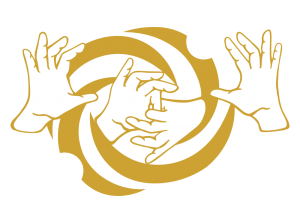

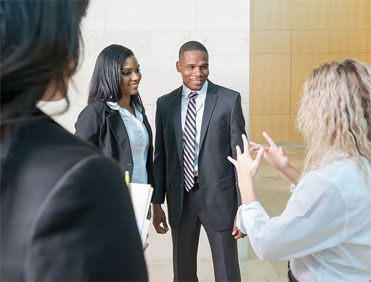

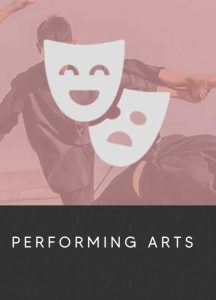
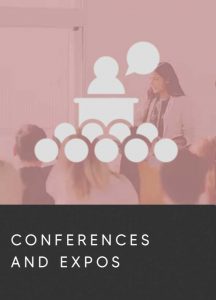
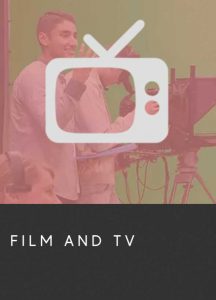
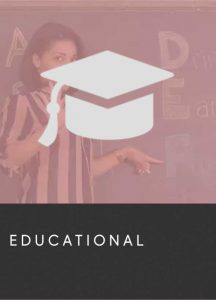
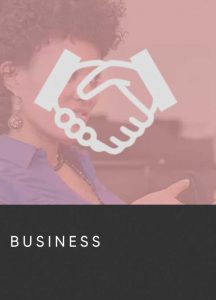
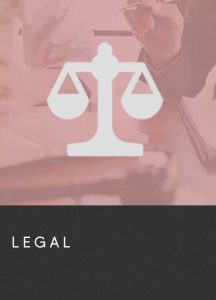
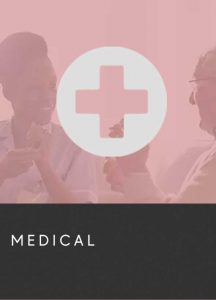
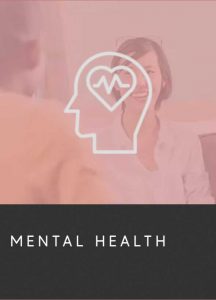
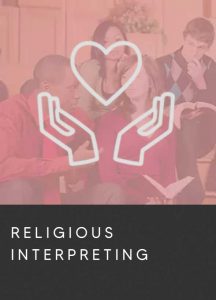
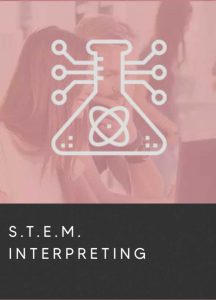
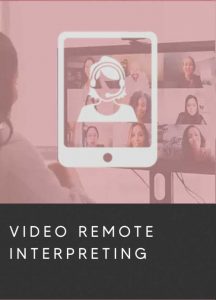
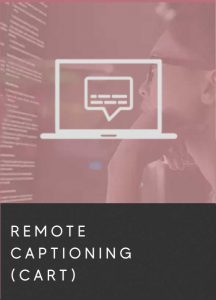

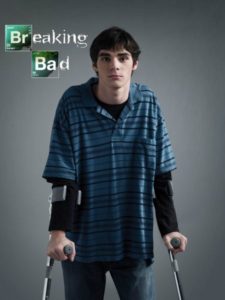 Under mounting pressure from a wide variety of demographics who feel underrepresented in film and television, the entertainment industry is finally beginning to show signs of diversity. It is important to recognize that this gradual movement toward a multicultural media is only the result of long and tiresome grassroots efforts. The fight for representation touches people from all cultural minority groups, and intersects in a powerful way. Here, we do not see change coming from the top down, but rather from the bottom up — we, the people, are dictating what the future of film and television will look like.
Under mounting pressure from a wide variety of demographics who feel underrepresented in film and television, the entertainment industry is finally beginning to show signs of diversity. It is important to recognize that this gradual movement toward a multicultural media is only the result of long and tiresome grassroots efforts. The fight for representation touches people from all cultural minority groups, and intersects in a powerful way. Here, we do not see change coming from the top down, but rather from the bottom up — we, the people, are dictating what the future of film and television will look like.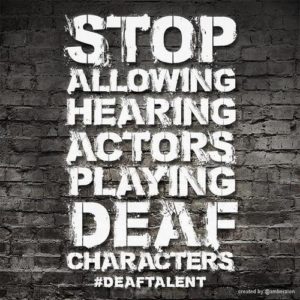 Over the past two years, the Deaf community has been actively pushing for greater cultural awareness through the #DeafTalent movement.
Over the past two years, the Deaf community has been actively pushing for greater cultural awareness through the #DeafTalent movement. 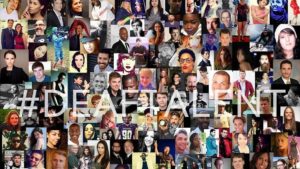 “Much of our inspiration today built on previous movements such as the historic 1988 Deaf President Now (DPN) movement at Gallaudet University which led to the passage of the ADA bill in 1990,” Charmaine Hlibok, Director of Fundraising at Mark Seven Deaf Foundation explains. “DPN will celebrate its 30th anniversary next March, and today’s deaf children have many more opportunities today than many of us had.”
“Much of our inspiration today built on previous movements such as the historic 1988 Deaf President Now (DPN) movement at Gallaudet University which led to the passage of the ADA bill in 1990,” Charmaine Hlibok, Director of Fundraising at Mark Seven Deaf Foundation explains. “DPN will celebrate its 30th anniversary next March, and today’s deaf children have many more opportunities today than many of us had.”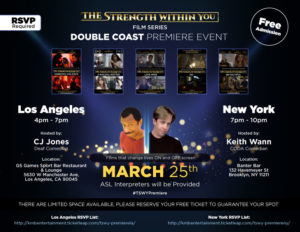 Set to make a bicostal debut on Saturday, March 25 with
Set to make a bicostal debut on Saturday, March 25 with 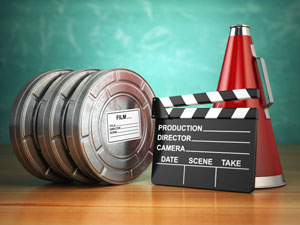 “It was a very short 1:54 minute silent film (almost a PSA) done by 2 amazing Deaf talents called ‘CIG.’ I saw it and thought: that is what I will do for me, and for people who, like me, are also seen as the ‘stupid, no-talent, no-good for anything’ in this world,” Belas explains. “Being involved with Deaf people for 3 years, I had already decided that my main goal when working in the industry was to work with Deaf Talents. So I just put 2 and 2 together, and came up with the idea to make this series.”
“It was a very short 1:54 minute silent film (almost a PSA) done by 2 amazing Deaf talents called ‘CIG.’ I saw it and thought: that is what I will do for me, and for people who, like me, are also seen as the ‘stupid, no-talent, no-good for anything’ in this world,” Belas explains. “Being involved with Deaf people for 3 years, I had already decided that my main goal when working in the industry was to work with Deaf Talents. So I just put 2 and 2 together, and came up with the idea to make this series.”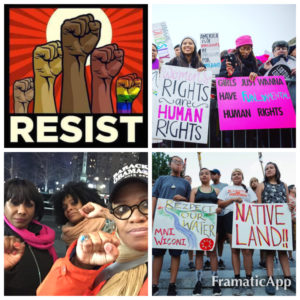 According to the project’s active
According to the project’s active 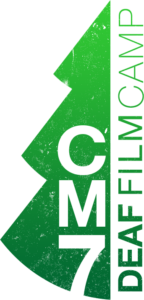 With the rise of the internet, which offers opportunity for visibility and a public platform, people who are d/Deaf/HoH have been actively correcting wrong assumptions, smashing stereotypes, and working to dismantle the structural barriers that oppress entire groups of people due to the way they are born and/or they way they choose to communicate. Members of the majority culture are now getting exposed to all different aspects of deafness and Deaf culture through intersectional social justice dialogues and deaf-created content. People are seeing, perhaps for the first time, that people who are deaf are mostly just regular everyday human beings who want the same kind of happiness and success as everyone else, and that they can do pretty much all the same things hearing people can do— except for hear.
With the rise of the internet, which offers opportunity for visibility and a public platform, people who are d/Deaf/HoH have been actively correcting wrong assumptions, smashing stereotypes, and working to dismantle the structural barriers that oppress entire groups of people due to the way they are born and/or they way they choose to communicate. Members of the majority culture are now getting exposed to all different aspects of deafness and Deaf culture through intersectional social justice dialogues and deaf-created content. People are seeing, perhaps for the first time, that people who are deaf are mostly just regular everyday human beings who want the same kind of happiness and success as everyone else, and that they can do pretty much all the same things hearing people can do— except for hear.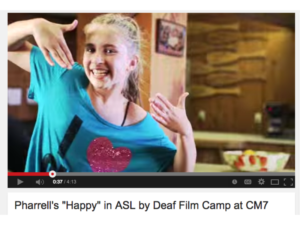 At the very roots of all grassroots movements are the younger generations. Working to ensure a future where d/Deaf/HoH children grow up confident in their ability to pursue their creative dreams without limitations,
At the very roots of all grassroots movements are the younger generations. Working to ensure a future where d/Deaf/HoH children grow up confident in their ability to pursue their creative dreams without limitations,  As an accessible, inclusive, and immersive program, CampMark7 fosters the innate potentials of young people who might otherwise encounter discouraging limitations. Deaf/HoH youth deserve more music and arts programs that enrich their lives and facilitate a deeper, reciprocal connection to the cultural arts. Supporting organizations that work with young people is easy, for example the
As an accessible, inclusive, and immersive program, CampMark7 fosters the innate potentials of young people who might otherwise encounter discouraging limitations. Deaf/HoH youth deserve more music and arts programs that enrich their lives and facilitate a deeper, reciprocal connection to the cultural arts. Supporting organizations that work with young people is easy, for example the  #DeafTalent is a cultural movement that is gaining traction in all areas of life. Talented Deaf individuals in fields across the board are working to defy social expectations, remove barriers, and prove that there are NO limits to what people who are deaf can do. My Deaf siblings and young nieces deserve every opportunity to manifest their own destiny and accomplish their own goals without suffering the prejudice of previous generations. It’s time for people to open their minds to the endless potential of our diverse population.
#DeafTalent is a cultural movement that is gaining traction in all areas of life. Talented Deaf individuals in fields across the board are working to defy social expectations, remove barriers, and prove that there are NO limits to what people who are deaf can do. My Deaf siblings and young nieces deserve every opportunity to manifest their own destiny and accomplish their own goals without suffering the prejudice of previous generations. It’s time for people to open their minds to the endless potential of our diverse population. When I joined the board in 2006 for CampMark7, I was a stay at home mom with 4 children and my 4th was just born. Gerry Buckley had asked me when I was very pregnant to consider serving on the board because of my involvement with the CODA community here in Maryland. I hosted their Winter Holiday party and was very involved with their year-round activities to make sure that my CODA kids had strong identity with other members the Deaf community, which is very important to me. Seeing that had a huge impact on my children’s attitude about having deaf parents because they would have other CODAs to look up to. They could feel proud and become very involved. Really it made a difference in how they were able to identify their own self esteem, perform better in school, understand their own abilities. It helped on all levels.
When I joined the board in 2006 for CampMark7, I was a stay at home mom with 4 children and my 4th was just born. Gerry Buckley had asked me when I was very pregnant to consider serving on the board because of my involvement with the CODA community here in Maryland. I hosted their Winter Holiday party and was very involved with their year-round activities to make sure that my CODA kids had strong identity with other members the Deaf community, which is very important to me. Seeing that had a huge impact on my children’s attitude about having deaf parents because they would have other CODAs to look up to. They could feel proud and become very involved. Really it made a difference in how they were able to identify their own self esteem, perform better in school, understand their own abilities. It helped on all levels. I am very passionate about the power of art to educate, inspire, and to spark curiosity. I feel that it is the best way to explain our language and culture to the world.
I am very passionate about the power of art to educate, inspire, and to spark curiosity. I feel that it is the best way to explain our language and culture to the world. In second grade, I wanted to be a writer. This was mostly because my family and the school system was pressured to raise me orally, with hearing aids and other devices. I was socially awkward and the best way I could communicate was on paper. I liked creating stories and novels I could escape into and avoid dealing with bullies and the feelings of loneliness that clung to me wherever I went.
In second grade, I wanted to be a writer. This was mostly because my family and the school system was pressured to raise me orally, with hearing aids and other devices. I was socially awkward and the best way I could communicate was on paper. I liked creating stories and novels I could escape into and avoid dealing with bullies and the feelings of loneliness that clung to me wherever I went. “Do not hide your enthusiasm. Do not hide your talents. Use it and show it to others.” This quote has definitely influenced me to become inspired into a softball umpiring career for one simple reason. Willing to take risks and accepting challenges are essentially significant to show the umpiring community that I have my abilities. I find it a once in a lifetime opportunity to show I am an exceptional umpire with consistent calls with 20/20 vision, alertness and keen anticipation on every playing call.
“Do not hide your enthusiasm. Do not hide your talents. Use it and show it to others.” This quote has definitely influenced me to become inspired into a softball umpiring career for one simple reason. Willing to take risks and accepting challenges are essentially significant to show the umpiring community that I have my abilities. I find it a once in a lifetime opportunity to show I am an exceptional umpire with consistent calls with 20/20 vision, alertness and keen anticipation on every playing call.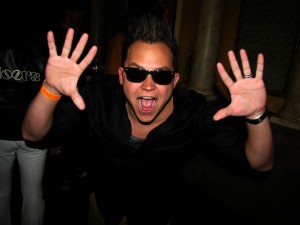 I grew up watching MTV with my brothers, listening to songs my parents and brothers played – which they included me by lip-synching songs so I could read their lips, witnessing the enjoyment of live music from watching my Dad and Uncle perform in their country-rock band The Forbes Brothers.
I grew up watching MTV with my brothers, listening to songs my parents and brothers played – which they included me by lip-synching songs so I could read their lips, witnessing the enjoyment of live music from watching my Dad and Uncle perform in their country-rock band The Forbes Brothers.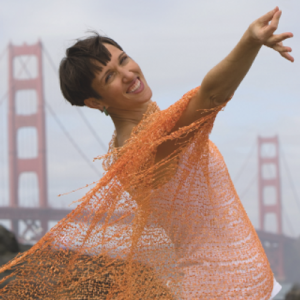 Born Kristen Marie Weiner, I am now known as Rajarajeshwari, my spiritually inspiring name. The vision of Deafhood Yoga® was channeled in 2008, after experiencing the depth of Dr. Paddy Ladd’s book “Understanding Deaf Culture, in Search of Deafhood”. In that class, the intense dialogue with other members of the Deaf community led to a powerful moment of understanding what the concept of colonization truly meant. I had the opportunity to learn and study Deafhood in the Deaf, collective community for two semesters.
Born Kristen Marie Weiner, I am now known as Rajarajeshwari, my spiritually inspiring name. The vision of Deafhood Yoga® was channeled in 2008, after experiencing the depth of Dr. Paddy Ladd’s book “Understanding Deaf Culture, in Search of Deafhood”. In that class, the intense dialogue with other members of the Deaf community led to a powerful moment of understanding what the concept of colonization truly meant. I had the opportunity to learn and study Deafhood in the Deaf, collective community for two semesters.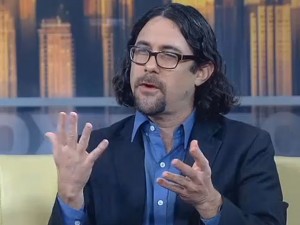 I was working at a deaf services agency and noticed that many difficulties my clients had were rooted in language and cultural barriers. I took a CDI training course thinking that it would benefit my work with diverse clients, but I came to realize that working as a CDI would mean that any influence I had in minimizing barriers would come during the actual situations rather than after the fact.
I was working at a deaf services agency and noticed that many difficulties my clients had were rooted in language and cultural barriers. I took a CDI training course thinking that it would benefit my work with diverse clients, but I came to realize that working as a CDI would mean that any influence I had in minimizing barriers would come during the actual situations rather than after the fact.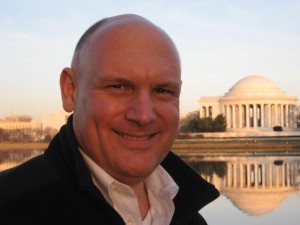 I grew up during the anti-war and civil rights movements of the sixties and cut my political teeth on resistance to racism and imperialism. I went to many demonstrations protesting Jim Crow at home and the war in Vietnam, but it wasn’t until the 1970’s that I realized discrimination based on disability was also a pernicious and pervasive problem. As I was becoming aware of civil rights for people with disabilities, I had an close-up encounter with discrimination against deaf children at a state school for the deaf in the South, and based on my reports, the American Civil Liberties Union was able to obtain legal relief for these children. This experience combined with my progressive background propelled me toward a career in the law.
I grew up during the anti-war and civil rights movements of the sixties and cut my political teeth on resistance to racism and imperialism. I went to many demonstrations protesting Jim Crow at home and the war in Vietnam, but it wasn’t until the 1970’s that I realized discrimination based on disability was also a pernicious and pervasive problem. As I was becoming aware of civil rights for people with disabilities, I had an close-up encounter with discrimination against deaf children at a state school for the deaf in the South, and based on my reports, the American Civil Liberties Union was able to obtain legal relief for these children. This experience combined with my progressive background propelled me toward a career in the law.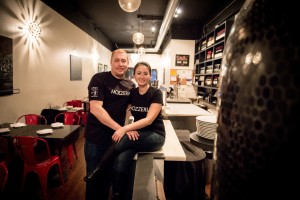 nspirations:
nspirations: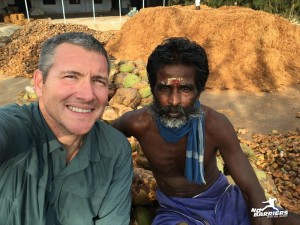 I graduated Gallaudet with TV, Film and Photography. Hollywood and TV Network had difficulty hiring Deaf people even though I had great internship with them. I decided to start a coffee shop with travel agency for 4 years before Jed (younger brother) pulled me into the internet age. That time internet was so new. We started many Deaf people with their website, business, organization, media. Started Deaflympics online in 1999 Davos, Switzerland and World Federation of the Deaf online media in 1999 Brisbane, Australia.
I graduated Gallaudet with TV, Film and Photography. Hollywood and TV Network had difficulty hiring Deaf people even though I had great internship with them. I decided to start a coffee shop with travel agency for 4 years before Jed (younger brother) pulled me into the internet age. That time internet was so new. We started many Deaf people with their website, business, organization, media. Started Deaflympics online in 1999 Davos, Switzerland and World Federation of the Deaf online media in 1999 Brisbane, Australia.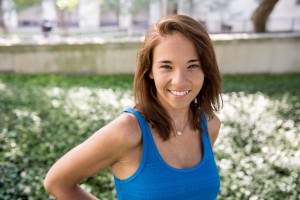 Inspirations:
Inspirations: